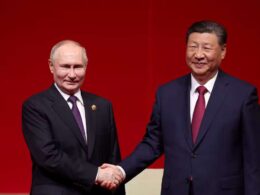Beijing’s proposal for the diversion of part of the flow of rivers from the Altai inside the borders of the Russian Federation to China is sparking “a stormy discussion in Russia,” Kseniya Smolyakova says, because both experts and ordinary Russians remember the debates that killed Siberian river diversion at the end of Soviet times.
China may have the money to build such a system, the Sibreal journalist says; but the threats to the environment and even the survival of the peoples living along any such shift in the flow of river waters have not changed. And Russians say the Chinese can’t overcome them. Consequently, resistance will continue to grow.
The first stage calls for the construction of a canal system of some 1500 kilometers from Russia through Kazakhstan to China by 2026 that will carry 600 to 700 million cubic waters to Chinese industries and consumers.
A second stage, to be completed by 2040, would expand the capacity of this system to 1.8 to 2.4 billion cubic meters of water, less than some of the more grandiose Siberian river diversion plans offered first in the imperial period and then both in Stalin’s times and in the 1970s, but still enormous.
But there is one element in common between the current Chinese plans and earlier ideas: They are being opposed by ecologists on environmental grounds and by the broader Russian community on ethnic ones. In the 1970s, Russians objected to river diversion because it would kill off Russian villages in order to save the growing Central Asian populations.
Moscow may be willing to make a deal; they are not; and this anger could help power regional protests just as it did 50 years ago.
What is striking about the current case is just how closely it parallels the initial stages of the discussion about Siberian river diversion in the 1960s and 1970s. Then, Moscow officials viewed it as something that could be built if the money could be found, regardless of the consequences for Russian villages.
But both a half century ago and now, the people who would be most directly affected are opposed – and angry at Moscow as well as at China.
Films and novels about what Siberian river diversion would mean not only agitated Soviet society at a time when few issues were allowed to percolate in the public media: they helped power the so-called “Russian party” within the Soviet government, helped divide it, and opened the way for environmental movements in the republics to become national ones.
Siberian river diversion thus became a major cause behind the demise of the USSR even if it was not as dramatic as the more proximate ones of a failed war in Afghanistan, an arms race Moscow couldn’t afford, and on-again, off-again attempts at reform. If Moscow and China go ahead, it could have an analogous effect on the Russian Federation.
And to the extent that is possible, it will be the irony of ironies: an alliance with China that Moscow thinks will save it may end by having exactly the opposite effect.
Further Reading:
- Russia to buy frigates from China
- China now building five frigates a year: Russia only one every ten
- Russian fears about China’s aspirations east of the Urals on the rise
- Beijing ready to pump water out of Russia’s Lake Baikal for China’s domestic needs
- ‘Chinese question’ looks far more threatening in Siberia than in Moscow
- Chinese to become second largest ethnicity in Russia, Moscow demographer says
- Moscow’s Crimean Anschluss taught China it can do the same in Asia, Russian analyst says
- Why invade when you can buy? China already owns 80% of Russian region





